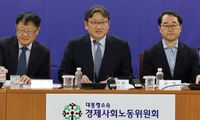On May 8, 2025, the Economic and Social Labor Committee (ESLC) proposed a significant change to South Korea's retirement policies, suggesting that while the current retirement age of 60 should remain, companies should be mandated to continue employing workers until age 65. This proposal has sparked intense debate between labor and business groups, highlighting the complexities of balancing employment stability for older workers with the need to create job opportunities for younger generations.
The ESLC's Public Interest Committee outlined a plan that would automatically renew contracts for workers who wish to continue their employment beyond the age of 60. This initiative is designed to address the challenges posed by an aging population while also considering the impact on youth employment. According to the proposal, if companies determine that continued employment of older workers negatively affects their ability to hire younger staff, they may be allowed to transfer older employees to affiliated companies.
"The current legal retirement age is 60, but the average retirement age is only 49.4 years," said a representative from the Korean Confederation of Trade Unions (KCTU), emphasizing the instability faced by middle-aged and older workers in South Korea, which is reported to be the highest among OECD countries. Labor advocates argue that extending the retirement age is essential for ensuring stable employment, particularly given that the existing wage system encourages early retirement.
However, the business community has reacted sharply against the proposal. The Korea Employers Federation criticized the plan, stating it would merely increase the financial burden on companies. They argued that a system where longer-serving employees receive higher wages could make it difficult for businesses to manage costs effectively. "This is an unilateral measure that only increases corporate burdens," the Federation stated, emphasizing that it could lead to a scenario where companies struggle to maintain productivity.
Moreover, the Korea Chamber of Commerce and Industry expressed concerns that the proposal essentially amounts to an extension of the retirement age, which could conflict with efforts to create job opportunities for younger workers. They argue that the focus should not only be on extending employment for older workers but also on ensuring that younger generations have access to the job market.
As the debate continues, labor groups have expressed disappointment with the ESLC's proposal, as they have long advocated for a straightforward increase of the retirement age to 65. With the upcoming presidential elections, the future of retirement policies is likely to be a key issue. Lee Jae-myung, a candidate from the Democratic Party, has pledged to promote the extension of the retirement age through social consensus, while Kim Moon-soo from the People Power Party has warned that such measures could ultimately harm youth employment.
The proposal is set to be phased in gradually, aligning with the national pension eligibility age of 65, which is scheduled to be adjusted starting in 2028 and fully implemented by 2033. The ESLC suggested a grace period until 2027, followed by incremental increases in the mandatory continued employment age every two years until it reaches 65.
Despite the discussions, there remains a significant divide between labor and management perspectives. Labor representatives argue that the responsibility for social welfare should not fall solely on companies, while business leaders contend that it is excessive to impose such obligations without addressing fundamental wage system reforms.
In a recent report, a citizen from Yeongdeungpo-gu noted, "With the declining working-age population, extending the retirement age seems essential." Meanwhile, another citizen from Gangseo-gu expressed concern that this could hinder employment opportunities for younger individuals, highlighting the delicate balance that policymakers must navigate.
Amid these discussions, the ESLC's Public Interest Committee has emphasized the need for a realistic approach to continued employment for older workers. They argue that instead of raising the retirement age legally, a mandatory continued employment system may be a more practical solution, especially in light of ongoing challenges in youth employment and the dual structure of the labor market.
As the ESLC prepares to formally deliver its recommendations to the next government, it is clear that finding a solution that satisfies both labor and business interests will be a complex and contentious process. The outcomes of these discussions will not only affect older workers but will also have lasting implications for the overall employment landscape in South Korea.
In conclusion, the debate surrounding retirement age and continued employment is emblematic of broader societal changes in South Korea, where an aging population presents both challenges and opportunities. The ESLC's proposal marks a significant step towards addressing these issues, but it will require careful consideration and collaboration between all stakeholders involved to ensure a balanced approach that supports both older and younger workers.





